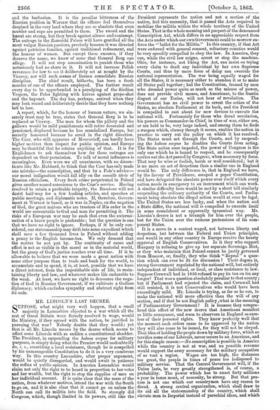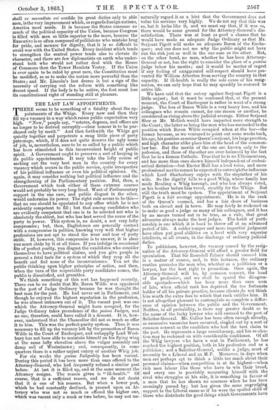MR. LINCOLN'S LAST DECREE.
SUPPOSE, what might very well happen, that a small majority in Lancashire objected to a war which all the rest of Great Britain were fiercely resolved to wage, would the Ministry, if they agreed with the nation, be justified in pursuing that war? Nobody doubts that they would; yet that is all Mr. Lincoln means by the decree which seems to affect some Liberals with so sudden a constitutional shudder. The President, in suspending the habeas corpus for military purposes, is simply doing what the Premier would undoubtedly do, 1. e., overriding a local resistance, though he is compelled by his unmanageable Constitution to do it in a very cumbrous way. In this country Lancashire, after proper argument, would be quietly disregarded, and would await in patience the reflux of public opinion. In America Lancashire would claim not only the right to be heard in proportion to her votes and her wealth, but the right to stop the supplies of men on her individual account It is quite clear that the mass of the nation, from whatever motives, intend the war with the South to go on, and it is also clear that it cannot go on unless the North can call its militia into the field. So strongly did Congress, which, though limited in its powers, still like the President represents the nation and not a section of the nation, feel this necessity, that it passed the Acts required to mobilize the militia within the whole territory of the United States. That is the whole meaning and purport of the denounced Conscription Act, which differs in no appreciable respect from the Acts under which our own Government could to-morrow en- force the "ballot for the Militia." In this country, if that Act were enforced with general consent, refractory counties would be very speedily compelled to obey the law. In America, they can, while the civil law reigns, arrest or stop the machine.. Ohio,- for instance, not liking the Act, can insist on trying every claim to draft any individual by her own Supreme Courts, and thus by mere force of delay can override the national representation. The war being equally waged for all the States, it is necessary either to abandon it or to make all States pull together ; but the Constitution, framed by men who dreaded power quite as much as the misuse of power, does not provide civil means, and Americans, to the frantic disgust of our Tories, will not hear of revolution. The Government has no civil power to arrest the action of the States, no absolute Parliament at its back, and the President is compelled to east about for new devices to execute the national will. Fortunately for those who dread revolution, his powers as Commander-in-Chief, in time of war, either are, or are held to be, very large indeed, and among them he finder a weapon which, clumsy though it seems, enables the nation in practice to carry out the policy on which it has resolved. The States must act through the Courts, and by suspend- ing the habeas corpus he disables the Courts from acting. The State action once impeded, the power of Congress is the only one which he is bound to respect, and he consequently carries out the Act passed by Congress, when necessary by force. That may be wise or foolish, harsh or well considered ; but it is no more an act of despotism than a similar one in England would be. The only difference is, that in England we have, by the favour of Providence, escaped a paper Constitution, and have delegated the absolute power over itself which every nation needs in emergency to an instrument which can work. A similar difficulty here would be met by a short bill similarly suspending the ordinary authority of the Courts, and Parlia- ment being absolute- the illegal action would at once be legal. The United States are less lucky, and when the nation and. a State differ, the national will is compelled to execute itself in some roundabout or apparently tyrannical way. Mr. Lincoln's decree is not a triumph for him over the people, but for the Union over the ruinous pretensions of its com- ponent States. It is a move in a contest waged, not between liberty and despotism, but between the Federal and Union principles, and would in any other country in Europe receive the hearty approval of English Conservatives. Is it they who support Hungary in refusing to give up her separate Sovereign Diet, or they who maintain that Poland cannot be justly governed from Moscow, or, finally, they who think " Repeal " a ques- tion which can ever be fit for discussion ? Their dogma is, strong Government regulated by the national will, but entirely independent of individual, or local, or class resistance to law. Suppose Cornwall had in 1836 refused to pay its tax on tin any longer? That was a question absolutely peculiar to that county; but if Parliament had rejected the claim, and Cornwall had still resisted, it is not Conservatives who would have been. exceedingly mild. Mr. Lincoln is trying, as far as he can, to make the national will more effective than the will of any section, and if that be not English policy ,what is the meaning of Parliamentary Government? It is because they compre- hend this effect of the new decree that Americans manifest so little annoyance, and seem to observers in England so care- less of their personal rights. They know perfectly well that the moment such orders cease to be approved by the nation they will also cease to be issued, for they will not be obeyed. That idea of holding the people down by military force, which se terrifies some of our Liberals, never occurs to an American, and. for this simple reason :—No conscription is possible in America while the country is not at war, and no possible revenue would support the army necessary for the military occupation of so vast a region. Wages are too high, the distances too great, the people in times of peace too indisposed to military service. That the Central Government will, if the Union lasts, be very greatly strengthened is, of course, a probability. The power which has to exact forty millions a year in taxes must, of necessity, be strong. But that pro- cess is not one which our countrymen have any reason to dread. A strong central organization, which shall draw to its aid all the statesmanship of the country, which shall elevate men to Imperial instead of parochial ideas, and which shall ex necessitate rel confide its great duties only to able men, is the very improvement which, as regards foreign nations, America most needs. It is because the States consume so much of the political capacity of the Union, because Congress is filled with men so little superior to the mass, because the Executive is so often composed of politicians who mistake brag for pride, and menace for dignity, that it is so difficult to avoid war with the United States. Every incident which tends to strengthen the central power tends also to elevate its character, and there are few diplomatists on earth who under- stand both -who woukl not rather deal with the House of Commons than the Tower Hamlets Vestry. If the Union is ever again to be ruled by great men, the Constitution must be modified, so as to make the nation more powerful than the States ; and Mr. Lincoln's last decree is but a sign of the necessity of carrying out the reform with something like decent speed. If the body is to be active, the foot must lose its constitutional right of standing still at pleasure.































 Previous page
Previous page